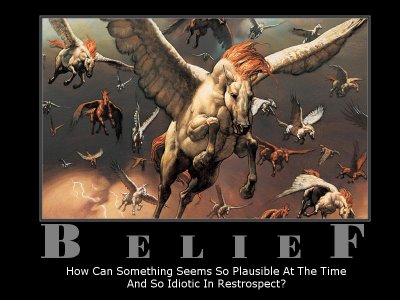Believing the impossible is possible

At first glance, it appears that we cannot believe the impossible. For example, it is impossible that 1=0, and to understand the very nature of the symbols "1" and "0", and how they are related, is to acknowledge this fact.
On the other hand, I think there are some cases where we do believe the impossible, a least for a little while.
In math and logic, there is such an argument as a Reductio Ad Absurdum (RAA). Here you assume something for the sake of showing something else in an argument. If you come to a contradiction (i.e. saying that something both is and is not true) then whatever assumption that you originally made must have been wrong to start with.
Here is my favorite proof for God's existence which uses RAA:
- Premise: The number 3 is both even and odd.
Conclusion: God exists.
Fire the pastor, run the evangelist out of town! To heck with faith--we got us a puh'roof! Sadly, atheists have an equally effective rejoinder:
- Premise: the number 3 is both even and odd.
Conclusion: God does not exist.
Both arguments share a bad premiss as an assumption -- that 3 is odd *and* even. This a contradiction. So neither of these arguments are sound, which means neither gives you a rational basis for believing the conclusion. But in both cases, the premiss is already known to be false (and silly.) In actual practice, however, it's not previously known whether a supposition is true or false. This is where my original claim returns: that we can believe an impossible claim.
Here's how. If we make a supposition in a proof, we affirm our belief in it until proven otherwise. During the process of extending the proof step by step, we are always on the look-out for a contradiction. Until it is found, the supposition is in play. Thus, for a few minutes -- or, maybe years if you're a professional mathematician -- you are affirming it as a belief. If it turns out you find a contradiction -- say, 20 steps down the line -- then before that time you were, all the while, believing an impossible claim! Of course, you can only know you were believing an impossible claim after the contradiction has been shown.
My suspicion is that in metaphysics [1] there are many impossible claims that are believed, but we just don't know they are impossible until after the fact has been shown.
Bertrand Russell [2], a famous logician, gives an example (which I'll paraphrase) of how easy it is to hold impossible beliefs (albeit unknowingly):
- Once upon a time, there was a town with just one male barber; and though every man in the town kept himself clean-shaven: some did so by shaving themselves, while others did so by attending the barber. So it seems reasonable to imagine that the barber shaves all and only those men (and perhaps unfortunate ladies) who do not shave themselves. (Call this "The Barber Truth" --i.e. TBT) But then there is this question: Does the barber shave himself? The only two answers show that belief in such a barber is impossible: (1) If the barber *does not* shave himself, he must, by TBT, shave himself. (2) If he *does* shave himself, he must, by TBT, not shave himself.
Again, assume there is such a barber --i.e. believing for a moment there is such a barber -- and you end up seeing you were believing the impossible! Q.E.D., baby! [3]
REFERENCES
[1] "Metaphysics" Wikipedia (Accessed Aug 12, 2006)
http://en.wikipedia.org/wiki/Metaphysics
[2] "Bertrand Russell" Wikipedia (Accessed Aug 12, 2006)
http://en.wikipedia.org/wiki/Bertrand_Russell
[3] "Q.E.D." Wikipedia (Accessed Aug 12, 2006)
http://en.wikipedia.org/wiki/Q.E.D.



1 Comments:
Hey Dr. M, how's life treating you nowadays?
Post a Comment
<< Home